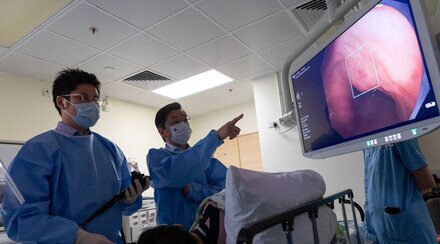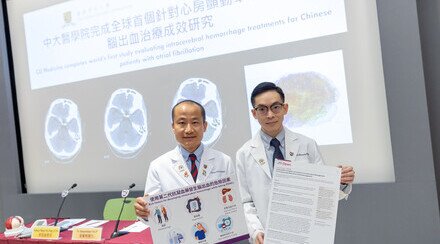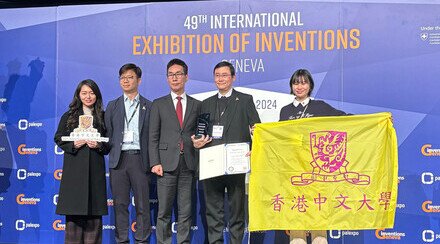CU Medicine proves AI-assisted colonoscopy increases adenoma detection rate by 40%, and trains a new AI platform to assist early-stage gastrointestinal cancer treatment
Artificial intelligence (AI) technology has rapidly been deployed in endoscopic diagnosis and treatment. The Chinese University of Hong Kong’s (CUHK) Faculty of Medicine (CU Medicine) has recently completed two studies on AI-assisted endoscopic technology, proving it has the potential to enhance performance in the diagnosis and treatment of gastrointestinal (GI) cancer, as well as to assist doctor training in endoscopy. Results have been published in international journals Nature Communications and Clinical Gastroenterology and Hepatology.

Professor Philip Chiu says the application of AI in medicine is to assist doctors to achieve better diagnostic and therapeutic outcomes. But the responsibility still lies on clinicians, with their experience and professional judgement.
Professor Philip Chiu Wai-yan, Professor and Head of Upper Gastrointestinal and Metabolic Surgery, Department of Surgery, CU Medicine, and Director of Chow Yuk Ho Technology Centre for Innovative Medicine, said, “The National Health Commission of the PRC has called for the promotion of minimally invasive surgery including endoscopic interventions across the nation as part of the National 14th Five-Year Plan, and encouraged innovation and knowledge transfer. As CU Medicine is a pioneer in the research and application of endoscopic technology, both in Hong Kong and globally, I believe its experience and expertise in healthcare and innovation can further the achievements of the nation and benefit more patients.”
Less experienced endoscopists achieved higher adenoma detection rate with the assistance of AI
Most colorectal cancers develop from colorectal polyps, of which adenomas are the most common type, so colonoscopies can effectively prevent colorectal cancer by identifying adenomas. However, the accuracy of adenoma detection is hugely affected by multiple factors, including the size, location and morphology of adenomas, and the doctor’s experience. CU Medicine therefore introduced AI-assisted colonoscopy for colorectal cancer detection in early 2021, when the technology was new. After analysing a large number of endoscopic images, the AI system can analyse new endoscopic images instantly during colonoscopy to alert doctors to identify adenomas and tumours in real time accurately. Some international studies had already proved the novel auxiliary tool increases the adenoma detection rate, but many of those involved were experienced endoscopists, and data were lacking on less experienced endoscopists.

CU Medicine introduced AI-assisted colonoscopy for colorectal cancer detection in early 2021. They proved in the latest study that junior endoscopists-in-training can achieve higher adenoma detection rate with the assistance of AI.
The CU Medicine research team conducted a study between April 2021 and July 2022, recruiting 22 junior endoscopists-in-training with less than three years of experience who had performed less than 500 endoscopies to study their performance using the AI-assisted endoscopic system. They performed colonoscopies on 766 patients, among whom 386 were assigned AI-assisted colonoscopy and the rest received conventional colonoscopy without AI. Results proved the junior endoscopists-in-training achieved about a 40% increase in adenoma detection rate relatively, with the use of AI. The performance was even more impressive among those endoscopists at beginner level. (see Table 1 for research result).
Table 1: Comparison of adenoma detection rates (ADRs) by AI-assisted colonoscopy and conventional colonoscopy without AI:
| AI-assisted colonoscopy | Conventional colonoscopy |
|---|---|---|
Overall ADR | 57.5% | 44.5% |
ADR* of small adenomas (less than 5mm in diameter) | 40.4% | 25% |
ADR of medium-sized adenomas (5mm-10mm in diameter) | 36.8% | 29.2% |
*ADR refers to the percentage of patients undergoing colonoscopy, who have one or more precancerous polyps detected.

Dr Louis Lau says the use of AI provides junior endoscopists with imagery guidance to practise the skills of a colonoscopy in a more standardised manner, and lower the chances of missing adenomas during the procedure.
Dr Louis Lau Ho-shing, Assistant Professor, Department of Medicine and Therapeutics, CU Medicine, said, “Our research is significant to the future development of AI in clinical medicine and endoscopic training. Junior endoscopists are generally less skilful and require a higher level of assistance during their initial learning phases. Our research is significant for endoscopic training because it shows that the use of AI provides them with imagery guidance to practice the skills in a more standardised manner. Results confirmed that the innovation helps enhance adenoma detection ability among endoscopists with different levels of experience.”
CU team establishes an AI surgical platform AI-Endo to detect early-stage GI cancer

The CUHK research team has established an AI surgical assistance platform for endoscopic submucosal dissection (ESD), AI-Endo. Study results showed AI-Endo enabled young surgeons who are still in endoscopy training to successfully complete an ESD in an animal model.
CU Medicine has been driving the development of innovative endoscopic therapeutic procedures for many years, which include the introduction of endoscopic submucosal dissection (ESD) in Hong Kong in 2004. ESD is a therapeutic approach to resect early-stage GI cancer which is a complicated procedure that requires special technical skills from endoscopists with vast experience. Given the increasing detection of early-stage GI cancers facilitated by population screening programme and diagnostic AI system, there’s an urgent need to disseminate the techniques of ESD so that more patients could benefit from this minimally invasive procedure. The team has established an AI surgical assistance platform for endoscopic submucosal dissection (ESD), AI-Endo. Study results showed AI-Endo enabled young surgeons who are still in endoscopy training to successfully complete an ESD in an animal model.

Professor Dou Qi explains that the AI interface is able to discern real-time procedures while the doctor performs ESD, guiding him/ her through the whole process, and providing data for postoperative analysis and review. The team will further explore the possible guidance to dissection layers and route with the system.
Professor Dou Qi, Assistant Professor, Department of Computer Science and Engineering, CUHK, explained, “To train AI-Endo, we compiled 47 complete ESD video clips that span a long period of 12 years, consisting of over 2 million frames, which allowed it to learn the entire surgical workflow and dissect each real-time action. The AI interface is able to discern real-time procedures while the doctor performs ESD, guide the doctor through the whole process, and provide data for postoperative analysis and review.”

Dr Yip Hon-chi says it takes long time and more than 100 procedures for an endoscopist to achieve competency in performing ESD independently. Even a minimal error in the route or depth of dissection may result in bleeding or perforation.
Dr Yip Hon-chi, Assistant Professor, Department of Surgery, CU Medicine, said, “It takes long period of time and more than 100 procedures for an endoscopist to achieve competency in performing ESD independently. AI-Endo allows us to shorten the training time and provide a reliable tool to assist the procedure.”
About CU Medicine’s development of endoscopic technology
CU Medicine has engaged in clinical research and translation of innovative endoscopic and laparoscopic devices with the industry since the 1980s. From conventional endoscopic procedures to robotics and AI, the Faculty has achieved tremendous success with its innovative research in endoscopy, which has had widespread clinical impact.












































